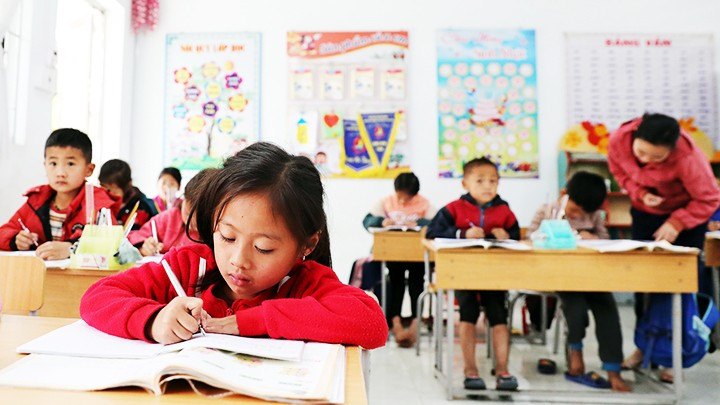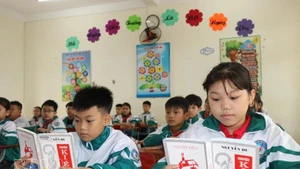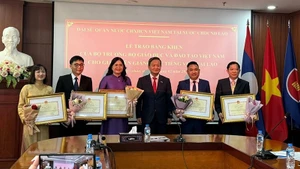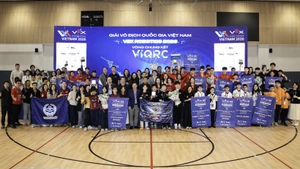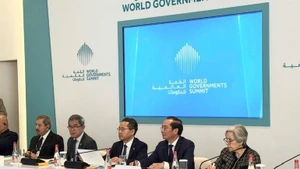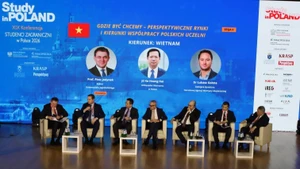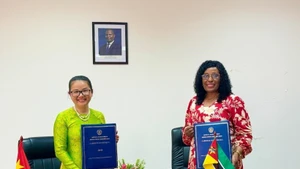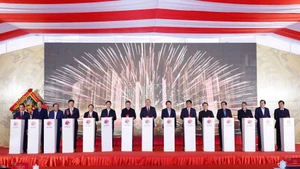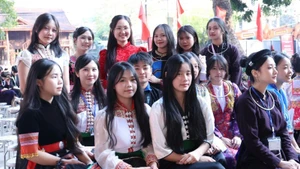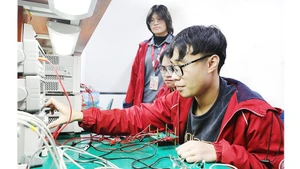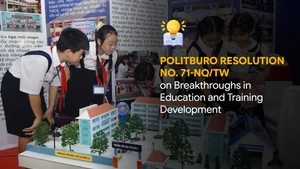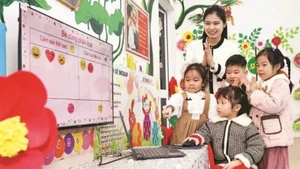Joy reaches every family
Under the Politburo's decision on February 28, all tuition fees for students from preschool to the end of public high school nationwide will be fully waived. Students in private and non-public schools will receive tuition subsidies equivalent to the tuition fees of public schools as stipulated by law, with families responsible for covering any difference between public and private school fees. This policy will take effect at the start of the 2025-2026 academic year (from September 2025 onward).
According to representatives from the Ministry of Education and Training (MoET), the Politburo's decision to waive tuition fees for students from public preschool to high school from the 2025-2026 school year aligns with Resolution No. 29-NQ/TW, issued by the Party Central Committee on November 4, 2013, regarding fundamental and comprehensive education reform. This includes a phased plan for tuition-free education from preschool to lower and upper secondary levels.
Currently, public school tuition fees vary by locality and grade level, ranging from 50,000 to 650,000 VND per month. This can be a significant financial burden for families with two or three children attending school simultaneously. Upon the public announcement of this decision, many people expressed joy and appreciation for this humane policy. It also serves as a major motivation for schools and families to further invest in and support students' education.
Phuc Khanh 1 Primary and Secondary School is located in a particularly difficult commune of Bao Yen District, Lao Cai, where arable land is scarce and the terrain is mountainous and rugged. According to Principal Pham Duc Vinh, after the impact of Storm No.3 last year, more families have fallen into hardship. Currently, the school has 13 students who have lost both parents. Among them, many have not received financial support because their homes were not directly affected by the storm or flooding, making life extremely difficult.
For instance, sisters Hoang Thi Anh (Grade 9) and Hoang Thi Gai (Grade 6) have required continuous encouragement from the school to attend classes, along with financial aid for tuition from various sources. “Now, with the new tuition-free policy, attending school is no longer an unattainable dream for them. Moving forward, we will focus on supporting 92 out of 320 students to stay at the school due to difficult travel conditions. This allows their parents to work on their farms with peace of mind, while the students can focus on their studies. This policy truly helps schools in remote areas maintain enrollment rates, reduce dropouts, and create better conditions for improving student learning quality”, Principal Pham Duc Vinh said.
With the announcement of tuition-free education, many workers and labourers with children studying in major cities have expressed their joy, as it alleviates part of their financial burden. Nguyen Thu H. (32 years old), a factory worker living in a rented room in Nguyen Khe Commune, Dong Anh Town, on the outskirts of Hanoi, shared: “My family has two young children in school. Now that tuition is free, we can save a significant amount. Since last year, my husband and I, who work in Dong Anh Industrial Park, have had unstable jobs and rely on overtime. Now, in our household budget, which includes rent, utilities, food, and daily expenses, tuition fees have been eliminated!”, she said with a relieved smile. Nguyen Van B. (40 years old), a motorbike taxi driver working around E Hospital, lives in a small alley on Tran Cung Street, Cau Giay District (Hanoi). He was overjoyed to hear that from the new school year, his only son, an eighth grader at Nghia Tan Secondary School, would be exempt from tuition fees. “His mother passed away early, and I had to leave my job due to a workplace accident. There were times when my health issues made my income unstable, and every school year, I had to struggle to gather enough for his tuition. Now, I am incredibly happy for low-income workers and freelance labourers like me!” he said.
The people’s aspirations have long been a priority for the Party and the State, but the biggest challenge has always been funding. With approximately 23 million students enrolled, the government must allocate around 30 trillion VND to cover tuition fees. After years of streamlining administrative structures and balancing financial resources, the Politburo made the historic decision to completely waive tuition fees for all students from preschool to the end of public high school nationwide.
Sustainable development trends in education
Minister of Education and Training Nguyen Kim Son emphasised: “This decision by the Politburo and the Government has a significant impact, not only on the education sector but also on society as a whole. It not only eases the financial burden on parents but also fosters educational equity, facilitates universal education, and creates the conditions for continued innovation and quality improvement in the education sector”.
Bui Manh Khoa, a National Assembly deputy specialising in legal affairs at the Law and Justice Committee under the Thanh Hoa Province National Assembly Delegation acknowledged: “A high-quality workforce and human resources are always regarded as a crucial strategic breakthrough. Tuition waiver is not just a policy but a vital step toward sustainable social development, enhancing the quality of human resources and ensuring equal learning opportunities for all children. It also aligns with the educational trends of many advanced countries, where free public education is considered the foundation for sustainable development”.
People’s Teacher Nguyen Thi Hien, Chairwoman of the Board of Directors of Doan Thi Diem High School (Hanoi), added: “As a long-time private educator, I agree with this policy. It will be the driving force for us to move towards universalising education to a high level. The policy also demonstrates fairness in educational development in both private and public systems. Thereby, it encourages private schools to improve the quality of training to attract students. On a broader societal level, as birth rates decline and population aging becomes a concern, free and reduced tuition policies will positively influence family planning in Vietnam, as many families will feel less financial pressure for education.”
While the tuition-free policy is a crucial step toward sustainable social development, its implementation requires additional comprehensive measures to ensure effectiveness.
One of the most pressing issues is the shortage of public-school infrastructure, especially in major cities. In Hanoi, for example, the student population increases by 40,000–50,000 students annually, necessitating the construction of 30–40 new schools each year, including both public and private institutions. According to the latest Hanoi Municipal People’s Committee statistics, the city still lacks 49 schools.
Hoang Van Linh, a parent whose child is currently in 9th grade at Dong Thai Secondary School (Tay Ho District, Hanoi), shared: “The reason why the entrance exam for public high schools is so competitive and stressful, is due to the lack of schools. Most families with middle or low incomes want their children to attend public schools because of the lower tuition fees. Now that public schools are completely tuition-free, parents worry that the competition in entrance exams will become even more intense. Therefore, based on the tuition-free policy, local authorities need to accelerate the construction of more public schools so that students can fully benefit from this policy.”
Besides the joy of receiving tuition-free education in the new school year, Le Mai Linh, a parent with two children attending public schools in Hoan Kiem District, said: “Each school year, parents still have to contribute to many expenses: the parent association’s fund, boarding fees, textbooks, uniforms, facility maintenance, extracurricular activities… and tuition is only a part of the total cost of raising a child in school. If these additional costs were also covered, it would truly ease the financial burden on families”.
A teacher at the Continuing Education Centre in Dong Da District, Hanoi, expressed concern: “We are promoting student career orientation after secondary school. While tuition fees are waived for public high school students and there are compensation policies for private schools, vocational and continuing education students are not yet exempt from tuition. This could affect the direction of student streamlining!”
Vietnam is undertaking a fundamental and comprehensive renovation of education and training. The urgent requirement now is to develop a high-quality workforce. The tuition-free policy will greatly support ensuring universal education, promoting the implementation of higher educational and training goals, and driving socio-economic development.
